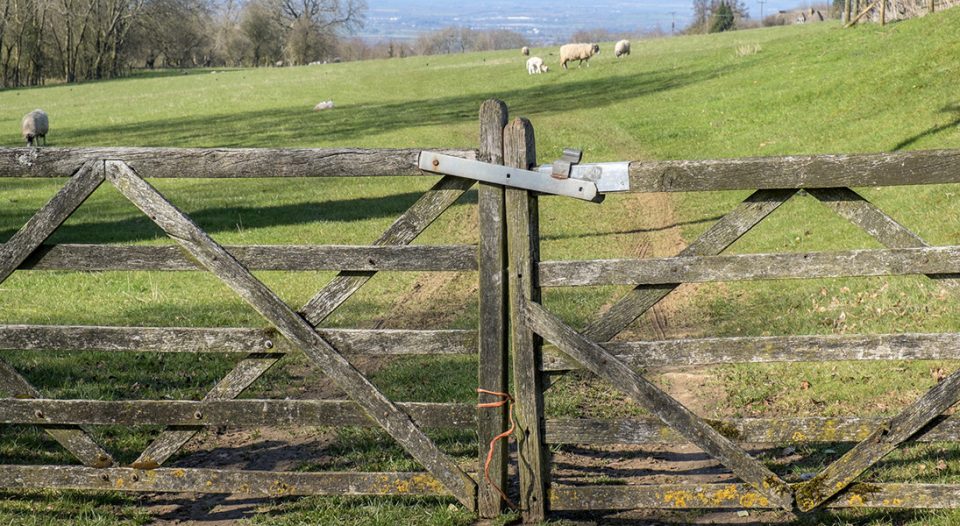Lectionary blog for May 3, 2020
Fourth Sunday of Easter
Acts 2:42-47; Psalm 23;
1 Peter 2:19-25; John 10:1-10
One of my favorite things to do when I teach Bible courses for lay leaders and ministry candidates is to take a familiar piece of Scripture and have them read it repeatedly until we shake off the comfort that obscures what the passage might be saying. One of my favorite texts to use is John 10:1-10. Many churches will read this passage on what has become known as Good Shepherd Sunday. And yet, there is no mention of Jesus as a/the good shepherd! That comes in the next verse after the lectionary reading ends. The good shepherd is part of a separate parable making a separate point. So, what is this week’s gospel reading telling us?
First, we must look at the context. John 9 is the story of Jesus healing the man born blind, and the difficulty some Pharisees had in reconciling that someone who made mud on the Sabbath could be the man who performed this ultimate sign of giving sight (9:30-32). While some Pharisees sided with Jesus (9:16), others couldn’t see past the violation of traditions that had come to be associated with Sabbath-keeping. The man who had been cured testified that only someone sent by God could open the eyes of the blind (9:32-33). Some Pharisees responded by throwing him out of the synagogue. Jesus tells his parable In the context of this failed leadership (religious leaders who should have celebrated the empowerment of one of their flock instead threw the man out for not following their traditions).
The central point of Jesus’ parable is that he is the gate and gatekeeper by which all true shepherds have access to the sheep (John 10:7). To make sure that we get the point, he said, “Very truly, I tell you, I am the gate for the sheep” and “I am the gate. Whoever enters by me will be saved, and will come in and go out and find pasture” (10:7, 9). Jesus isn’t the shepherd in this parable. He is the gate who keeps the sheep safe from robbers, thieves and false shepherds. In fact, “the door of Jesus” seems to have been used to describe Christ so frequently by the early Christian community in Jerusalem that even those who persecuted his Jewish followers knew of this term (Eusebius Ecclesiastical History 2.23.8, 12).
“Very truly, I tell you, I am the gate for the sheep” and “I am the gate. Whoever enters by me will be saved, and will come in and go out and find pasture”
Jesus pointed out that true shepherds accessed the sheep by that gate/gatekeeper and the sheep followed them. But false shepherds and thieves tried to steal sheep. Happily, in Jesus’ telling, the sheep are sophisticated enough to know the difference between true and false shepherds (10:5). Jesus is critiquing religious leaders who don’t make his presence and leadership central. They are false shepherds who can’t hope to lead the flock well, and John makes an editorial comment to make sure we know that (10:6).
As I said before, Jesus speaks about himself as the good shepherd later in John 10. But in the other readings for this week, we do have a description of what a good shepherd does. Psalm 23 compares God to a shepherd who takes good care of the sheep. My years living in southern Israel and North Africa have drastically shaped my understanding of this psalm. God makes sure that the sheep have plenty of food where they are, and that the sheep are provided drink from “resting waters.” מֵי מְנֻחֹות is probably best understood as water that is unlikely to suffer from flash floods. Indeed, even when the shepherd leads the sheep through dangerous slot canyons (“valley of deathly shadows”), which can flood at a moment’s notice, the psalmist is comforted that the shepherd is with the sheep. God’s modeling of a true shepherd is the opposite of one who abandons or holds himself or herself aloof from the flock. The good shepherd goes through everything that the sheep experience.
Just to touch on the Acts 2 passage briefly, it seems that the earliest shepherds of the Jesus movement were busy teaching, fellowshipping, eating together and praying with their flock. In this context, the apostles, as Jesus’ chosen shepherds, displayed signs and wonders. And I wonder if any sign is so powerful as all the believers taking care of each other financially? Jesus’ followers sold what they needed to sell and gave the profits away so no one would be hungry. Crucially, in the midst of all this sharing, the disciples broke bread from home/κατ᾽ οἶκον (Acts 2:46), giving us solace as we do the same in the midst of our sheltering in place.
It seems to me that, in light of COVID-19, Jesus has opened the gate to his beloved sheep and asked us all to be good shepherds. How will we take care of the people—our neighbors, our vulnerable relatives and congregants, our folks facing financial struggles and unemployment, and those who are losing loved ones—whom God has asked us to take care of? Make no mistake, Jesus is the gate who protects the sheep from thieves and robbers. Will we be good shepherds of those Jesus has entrusted to us?





